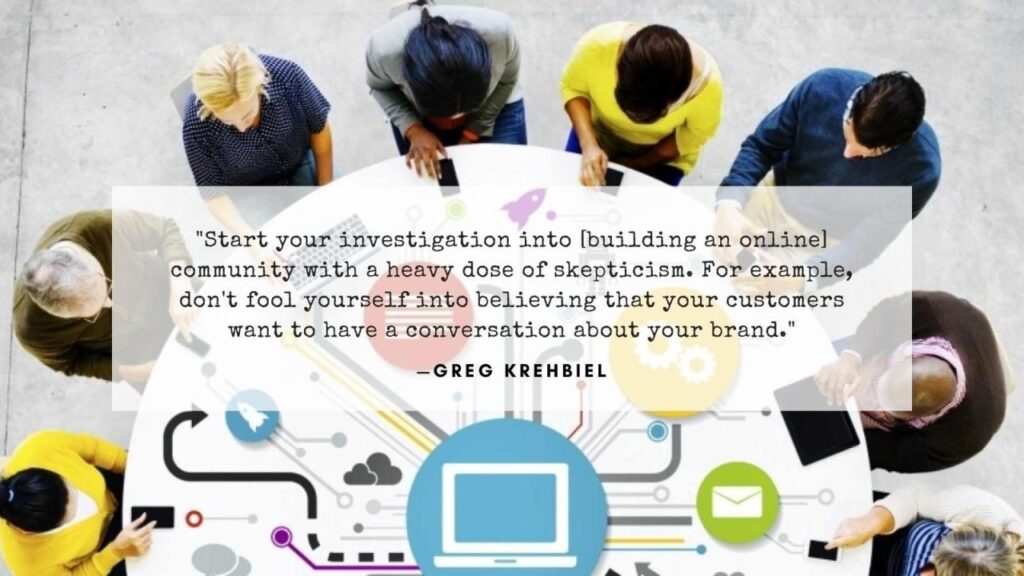Ideas to transform an event or periodical into an on-going relationship
Creating a strong relationship with your customers when you only have periodic contact with them is hard — whether that means an annual event, or a quarterly or monthly subscription. Even if you email them every day, you don't know if they're engaged, or if you're meeting their needs. Consequently, many content-driven businesses are trying to future-proof their model by building an online community.
The need is most acute for businesses that are built around an annual event, but the same concepts apply to any business that's trying to provide specialized information to a niche audience.
Just as the transition from print to digital caused publishers to re-think their business models, the shift from in-person events to virtual and hybrid events caused a lot of people in events to re-think their basic assumptions.
"Why do we need an event? We’re not traveling to the office, and we're used to meeting online. Why do people have to meet face to face, or participate in real time?"
But these transitions aren't binary. Print is still with us. AM radio is still with us! And the truth is that in-person events are better than virtual or hybrid events in a lot of ways. The solution is not revolution, but evolution. Don't destroy a model that works, but find new ways to meet the needs of your customers.
One of those ways is to build an online community.
Full disclosure: I’m not expert at this, and I’m sure I missed a thing or two, so please use the comment section to add your ideas and opinions.
(By the way, one thing I'm good at is reviewing lots of information, summarizing it and explaining it clearly, which means I can help you write an RFP. If you need help with one, give me a call.)

Does your market want "a community"?
Just because you have an annual event doesn’t mean people want to dwell on it all year, and even if they read your magazine cover to cover, that might be all they want.
Start your investigation into a community with a heavy dose of skepticism. For example, don't fool yourself into believing that your customers want to have a conversation about your brand. If you’ve been bit by that bug, please order this book right now and read it as soon as possible.
Ask yourself these questions …
- Why is a community a benefit to the customer, and not simply a means for you to flatten your revenue curve?
- What’s the purpose of the community?
- Why would someone give up their valuable time to participate on an on-going basis?
- What are the benefits of staying in contact between events / issues?
Be skeptical, but don’t be a naysayer. There are a lot of possible benefits that may or may not apply to your market. I hope this list sparks some creative thinking.
Benefits of a community
Access to recordings, or other forms of media. You heard a great presentation at the annual conference, but it wasn’t relevant at the time, so you forgot the key points. Being able to go back and listen – or forward it to a co-worker who couldn’t attend – is a big benefit. You may also have a podcast associated with your publication, and maybe your editor-in-chief gave a great interview that your subscribers would like to hear. With an online community, you can provide a platform where members can log in and access recorded sessions or other forms of media.
On-going questions. There’s no way you can ask all the right questions in the five-minute Q&A at the end of a talk, or in your "letters to the editor" page in your magazine. And the conference speaker might not be the right person to answer the question anyway. Provide a forum where people can raise and answer questions throughout the year.
Bios of speakers, authors and experts. Nobody remembers the intro at the conference, and the byline doesn't say enough about your subject-matter experts. Providing the bios of your subject matter experts can be useful to your audience to get a more complete picture of the people you're asking them to trust.
Surveys. Data is everything to your business, and to the businesses of the people in your community, but how can you and they best capture that data? For example, the CFO of one of your member companies wants to know if his credit card decline rate is out of the ordinary for the market. Your editors would like to know how people are reacting to their stories. Provide a means for you and your subscribers / members to survey their peers.
A way to meet other people. One of the main reasons people go to conferences is to make contacts. The hallway, the lunch, the cocktail hour, and the dinners when the show is done are often the most profitable times. But "meeting" online is less than ideal, and it probably always will be. It will never be as good as in person, but there are ways to make it less bad.
By mixing up the ways your community can meet and interact — online as well as in person — you can provide an opportunity for people with different personalities to shine.
If you publish a niche magazine, your subscribers might like to get to know one another and bounce their ideas around with their peers.
To facilitate community …
- Ask people to upload pictures
- Include a video chat function
- Ask users to complete their profile
- Link to other networking sites or opportunities
You might even be able to connect people by their interests or job function, which leads to …
Peer connections. Your community has lots of people with specialized needs and skills. If possible, create special break-out discussions by job title or function.
The ability to sleep on it. Create opportunities for long-form answers so that your people don’t have to think on their feet. Provide them time to reflect and showcase their expertise to their peers in the community. Speed networking, roundtable discussions and Q&A periods don’t always get you the best answers.
Connecting buyers and sellers. Your market includes people who need things, and people who want to sell them things. Salesmen at a conference are hoping for a confluence of desire and opportunity. That is, they meet Person A with Solution A right at the time he has Problem A. But that’s rare. By allowing vendors and salesmen to participate in your community, they can "be there" when the need arises.
A lot of people think it's wrong to include vendors in a community, but I think they belong there. They have a broad perspective on how solutions apply to different situations. Also, many people purchase a magazine, or join an association, precisely because they want to know vendors that service that niche.
Training. Break up your audience by discreet skills and tasks so you can find opportunities for training and/or mentoring. Try to make your community part of the on-boarding process for professionals in your industry. And don’t discount the willingness of the people in your community to help others. It truly is more blessed to give than to receive. Most people are willing to give back.
Parties. Bringing together people with a common interest is a good way to promote a community. I've even heard of companies that have virtual parties. The idea sounds odd to me, but some people have had success with it. Include music. Bring in experts for wine tastings. Send packages ahead of time to your participants.
Virtual tours. The idea here is simply to provide a fun thing for people in your community to do together. It doesn’t have to be related to your market. One company I know does virtual tours of animal rescue farms.
And, of course, Use a CDP. It should go without saying that all these things will be more effective if you’re using a Customer Data Platform with your online community. If you’re curious about CDPs, contact me and we can talk.
Use your community to improve your product
Like most everybody else, I’m looking forward to getting back to in-person events. But I’m also looking forward to seeing how what we’ve learned during this enforced virtual regime will bring new innovations to live events.
In a similar way, I'm tired of the print vs. digital argument. There are some things that print does very well, and there are some things that digital does very well. Use each medium to make the other better.
For events, connecting people ahead of an in-person event can improve the quality of the live event. Consider these possibilities.
Schedule meetings with key contacts. Use your community platform to make it easy for people to schedule meetings.
Provide papers / presentations (or abstracts) before the event. I know this is hard from an operations / organizational point of view. Most speakers wait until the last minute to finish their presentations. But to the extent you can at least get the outline of the presentation in the hands of attendees, they’ll be able to pose questions in advance. This can help the speaker fine-tune his presentation. And the more attendees know beforehand, the better they’ll be able to choose which presentations they want to attend.
Now it’s your turn
Okay, those are the ideas I've culled from here and there, sprinkled with some thoughts of my own. I’m sure I’ve missed a thing or two. Please drop your suggestions in the comment area. (You might have to scroll to the top to see the link for leaving a comment.)
I hope you found this issue of The Krehbiel Report interesting and helpful. Please feel free to comment, and please share this article with anyone who may find it useful. And by all means give me a call if you have any questions about this email, or about anything in the marketing / technology / publishing space.




Greg,
This is a well-thought out summary that everyone should at least consider. Every nugget here has possible revenue streams associated with it.
Sitting down with all the key players within the company is the best way to flesh out all the unique offerings, content, connections, in-house personalities, i.e. editorial rock starts, industry expertise, data, audience insights, etc.
You laid out a recipe of success. Thank you for sharing!